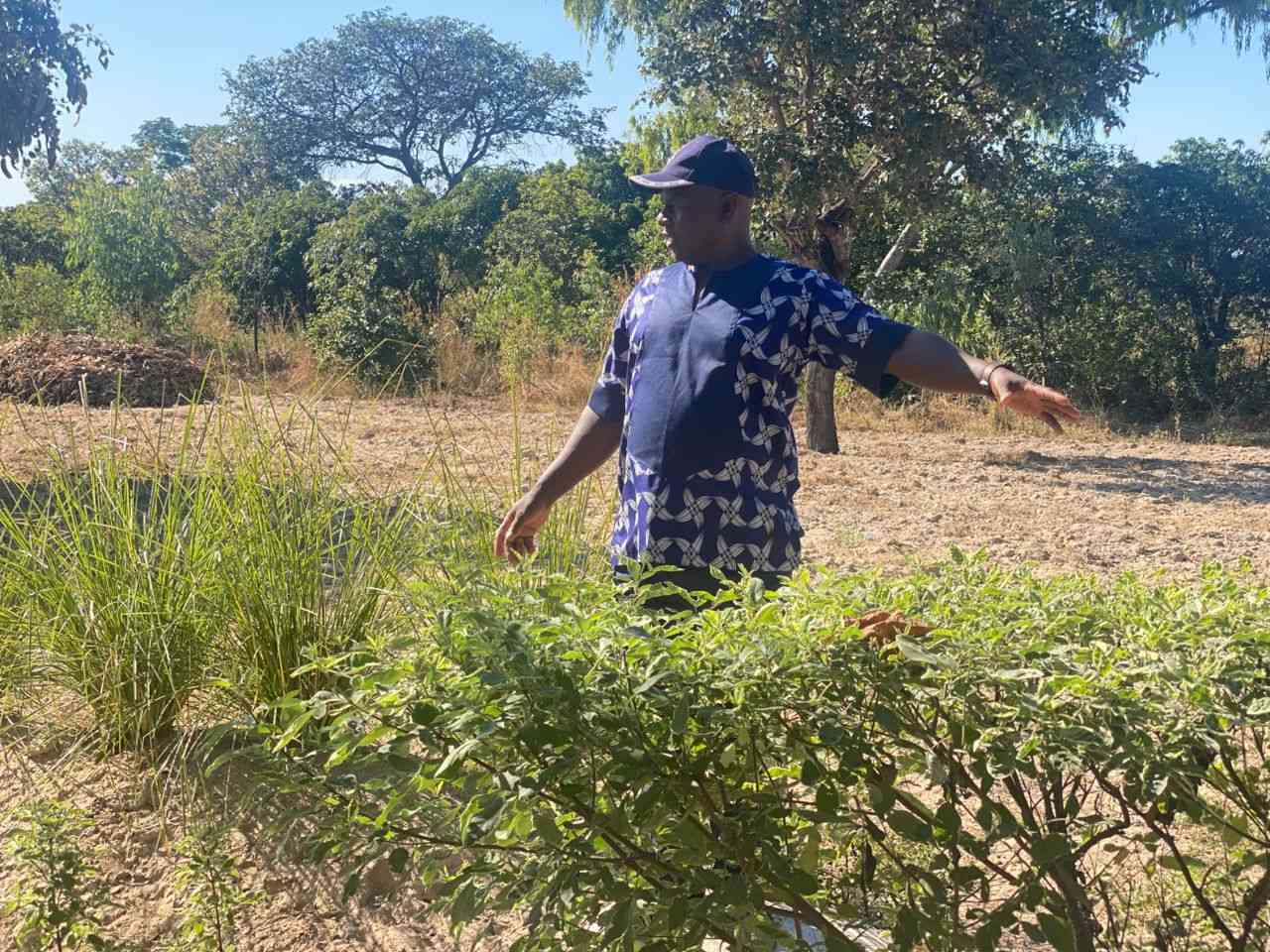
ONCE a school painter, today a farming icon.
That is the remarkable story of Dzingai Gondo (59), a farmer from Zvimba district who has embraced agroecology, not just as a means of survival, but as a way of life in Zimbabwe, grappling with the harsh effects of climate change.
A visit to Zvimba opened a window to a community determined to resist the parched reality of climate extremes through sustainable farming methods.
At the heart of this movement are farmers like Gondo, who also has become a field officer of Zvimba through his excelling work in agroecology and whose homestead has become a centre of excellence for agroecological farming under the Zimbabwe Smallholder Organic Farmers Forum (Zimsoff).
Learning, leading, thriving
Gondo’s farming journey took a major turn after a farmer-to-farmer exchange visit to Masvingo’s Shashe agroecology training centre officially opened by Zimsoff to teach its farmers across Zimbabwe on the new sustainable farming methods.
There, he learned methods to conserve water and rejuvenate poor soils. Today, he’s not only applying those methods, but also sharing them with others.
“I started by digging contours and planting local grass to trap and retain water. I also dug wells around my garden. That’s how I managed to sustain my crops even during dry spells,” said Gondo, as he spoke to a group of attentive farmers who were jotting down notes in his thriving fields.
- Zim farmers embrace agroecology
- Farmers urged to venture into agroecology
- Cultivating agroecology in Global South
- Sustainable farming transforms Shashe community
Keep Reading
The demonstration was more than a lesson; it was a ripple of transformation.
With banana plantations, sweet potatoes, sugarcane, horned cucumbers, cassava and an impressive variety of vegetables, Gondo’s land has become a model of climate resilience.
What’s more, his success has paved the way for his children’s education — he’s managed to send them all the way to university.
“I used to survive on getting painting contracts in schools, but today, I live off the land. Agroecology changed my life, and now I’m helping others do the same,” Gondo said.
“Through interactions, I managed to be friends with boarding schools such as Kutama and Moleli High here in Zvimba.
“For me to be friends with them I used to be a contractor painting their schools.”
He added: “One of the teachers there asked what I did on my spare time, that’s when I told them that I am also into farming.
“They then asked if I could supply them with variety of vegetables, I started supplying them with onions, bananas, carrots and tomatoes, sometimes beans.
“I managed to supply them for seven years. My first born finished university in 2008, the second in 2012, my last born then ended in Form 6 and relocated to South Africa.”
In a region where erratic rains and prolonged dry spells threaten livelihoods, Gondo and other farmers have adopted innovative water preservation techniques.
These include digging contours to trap rainwater, planting vetiver grass to retain soil moisture and constructing hand-dug wells to irrigate gardens during dry spells.
“We don’t wait for rain anymore,” Gondo explained, as he showed fellow farmers the shallow channels snaking through his fields.
“We trap it, we store it and we use it wisely.”
A new generation: Taurai Chikaka’s journey
Agroecology is a people-centred system of sustainable agriculture and a social justice movement driven by local farmers and other food producers to maintain power over their local food systems and protect their livelihoods and communities.
Zimsoff works in rural areas in Zimbabwe and its national reach is realised through the organisation of regional clusters of local farmers’ organisations.
In each cluster, households are organised in groups/clubs.
A number of this form a community of practice which in other words is called a smallholder farmer organisation (SFO) and a number of this form a cluster.
There are four clusters with over 19 000 members, namely the central cluster covering Masvingo and Midlands provinces, the eastern cluster covering Manicaland, the northern cluster covering Mashonaland East, West and Central and the western cluster covering Matabeleland North and South.
Each cluster has an average of 15 SFOs with varying membership.
Zimsoff yearly gathers its farmers from different SFOs to showcase their seedbanks, showing how they have adapted and fought hunger through agrocoelogy practices.
Seedbanks are facilities that assist farmers, communities and households that are affected by climate change to access locally adapted crop varieties and enhance related indigenous knowledge and skills in plant management, including seed selection and distribution.
Gondo’s influence stretches far and wide.
Taurai Chikaka (39) joined Zimsoff in 2021 after witnessing Gondo’s success.
Inspired, she began her agroecology journey and has now earned her own centre of excellence.
“I was invited to Gondo’s house to come as a community member who was also into farming. Little did I know that I was missing out on a lot, in terms of sustainable farming.
“I noticed that Gondo was using natural organic manure. In his fields there was no fertilizer, nothing. I was inspired and told myself that I was going to try this at my home too,” she said.
“First, I took number seven and won a grass cutter. Then I came third and got a digger. I didn’t stop. The third year, I was number one and won a solar-powered water pump,” added Chikaka, beaming with pride.
“Now I’ve expanded my garden and dug 14 wells for water preservation. The solar pump changed everything, I can water a bigger field now.”
She said she also got the privilege to visit other areas that are practising agroecology such as Mhondoro, where she mingled with other farmers.
“We managed to buy goats and shared them equally. All in all, I went away with 25 goats, including a few that I had. Last week, I sold 14 goats and managed to buy my building materials since I am building my four-roomed house,” Chikaka said.
“Zimsoff has really helped me a lot. I no longer sleep on a hungry stomach. Recently, I sold beans that I harvested. I sold each bucket for US$50, which is enough to sustain me and develop my livelihood.”
Zimsoff is an active founding partner of the Zimbabwe Seed Sovereignty Programme, an alliance of seven Zimbabwean civil society organisations working towards greater seed sovereignty in Zimbabwe.
According to Zimsoff, its focus is to do farming in harmony with Mother Earth as climate change is real, “but if communities take care of their natural resources, they and future generations will benefit”.
Safe guarding indigenous trees
Agroecology at Zimsoff goes beyond crops. Farmers are taught to protect indigenous trees and use them sustainably.
Trees, often referred to as silent doctors, are vital for treating ailments, enriching the soil, and providing food during famines.
Forests, being the most productive and self-sustaining terrestrial ecosystems on earth, require minimal maintenance once established, making them a valuable resource.
According to the United Nations Food and Agricultural Organization, 40%, or about 15 624 000 hectares, of Zimbabwe is forested.
Among these, 5,1% qualify as primary biodiverse and carbon-dense forests.
Presently, Zimbabwe boasts roughly 130 000 hectares of planted or exotic trees.
“Trees are our silent doctors,” said one participant during a field session.
“Each serves a purpose — whether it’s medicinal, nutritional, or ecological.”
“Trees play a vital role in our community. We utilise them to treat various ailments, such as stomach issues, leg problems, ear infections, and even support pregnant women. Moreover, during times of famine, some trees have served as a source of food for our people.”
They urged everyone to safeguard trees, recognising their immense value to the well-being and survival of society.
“By protecting these natural resources, we are ultimately protecting our own future.”
Present at the event was Chief Zvimba’s representative, who said: “What Gondo did today was exceptional. He is showing us that he is fighting to end hunger and also uplift his community.
“His farming method is cost-effective, utilising natural organic residue. Unlike fertilisers that only promote plant growth, Gondo uses compost to nourish the soil, as well as leaves from trees.
“'Getting innovations like this is a blessing. I applaud Gondo and urge other farmers to follow suit. In fact, I’m inspired to practice this method myself, and I encourage young children to venture into this sustainable farming approach, which yields good produce.”
The chief’s representative added: “We are getting older and we want to leave the youth with initiatives like these that can benefit future generations.
“We urge farmers here to teach their children about agroecology. I commend Zimsoff for providing farmers with the opportunity to learn from one another, equipping them with knowledge to sustain themselves and earn a living through agroecology.”










